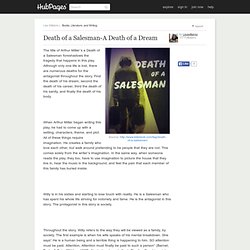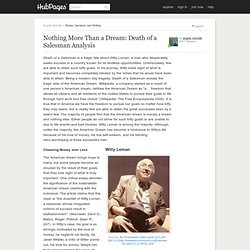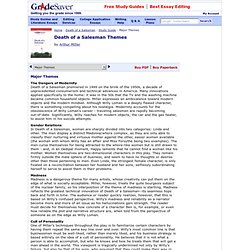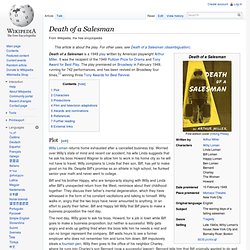

Death of a Salesman-A Death of a Dream. The title of Arthur Miller’s a Death of a Salesman foreshadows the tragedy that happens in this play.

Although only one life is lost, there are numerous deaths for the antagonist throughout the story. First the death of his dream, second the death of his career, third the death of his sanity, and finally the death of his body. When Arthur Miller began writing this play, he had to come up with a setting, characters, theme, and plot. All of these things require imagination. He creates a family who love each other, but walk around pretending to be people that they are not. Willy is in his sixties and starting to lose touch with reality. Throughout the story, Willy refers to the way they will be viewed as a family, by society. Nothing More Than a Dream: Death of a Salesman Analysis. Self-Absorption Self-absorption is the main reason for this inability, because he only sees life from his own point-of-view.

He makes decisions without fully understanding the repercussions that his actions will have on others lives and consequently his own. One of his greatest selfish decisions is his affair. Although Witalec argues that Willie truly believes he cheats “out of loneliness for his wife, Linda. But [in fact]… he is driven by feelings of inadequacy and failure to seek himself outside of himself, in the eyes of others. His greatest insecurity is that he is never as successful as he feels he should be. Willy’s idolization of Ben also hinders Willy in his quest for the American dream. Death of a Salesman: Important Quotations Explained.
And when I saw that, I realized that selling was the greatest career a man could want. ’Cause what could be more satisfying than to be able to go, at the age of eighty-four, into twenty or thirty different cities, and pick up a phone, and be remembered and loved and helped by so many different people?

Willy poses this question to Howard Wagner in Act II, in Howard’s office. He is discussing how he decided to become a salesman after meeting Dave Singleman, the mythic salesman who died the noble “death of a salesman” that Willy himself covets. His admiration of Singleman’s prolonged success illustrates his obsession with being well liked. He fathoms having people “remember” and “love” him as the ultimate satisfaction, because such warmth from business contacts would validate him in a way that his family’s love does not.
I saw the things that I love in this world. A diamond is hard and rough to the touch. Nothing’s planted. Death of a Salesman. Death of a Salesman is a tragedy about the differences between a New York family's dreams and the reality of their lives.

The play is a scathing critique of the American Dream and of the competitive, materialistic American society of the late 1940s. The storyline features Willy Loman, an average guy who attempts to hide his averageness and failures behind delusions of grandeur as he strives to be a "success. " The idea for the play first manifested itself as a short story, which Arthur Miller abandoned. His interest was renewed later on however, by an uncle who was a salesman. When the play version appeared on Broadway, it was a total hit.
Death of a Salesman Themes. The Dangers of Modernity Death of a Salesman premiered in 1949 on the brink of the 1950s, a decade of unprecedented consumerism and technical advances in America.

Many innovations applied specifically to the home: it was in the 50s that the TV and the washing machine became common household objects. Miller expresses an ambivalence toward modern objects and the modern mindset. Although Willy Loman is a deeply flawed character, there is something compelling about his nostalgia. Deathsalesman. Death of a Salesman - Wikipedia. Plot[edit] Willy Loman returns home exhausted after a cancelled business trip.

Worried over Willy's state of mind and recent car accident, his wife Linda suggests that he ask his boss Howard Wagner to allow him to work in his home city so he will not have to travel. Willy complains to Linda that their son, Biff, has yet to make good on his life. Despite Biff's promise as an athlete in high school, he flunked senior-year math and never went to college. Biff and his brother Happy, who are temporarily staying with Willy and Linda after Biff's unexpected return from the West, reminisce about their childhood together. The next day, Willy goes to ask his boss, Howard, for a job in town while Biff goes to make a business proposition, but neither is successful. Biff leaves the restaurant in frustration, followed by Happy and two girls that Happy has picked up.
Characters[edit] William "Willy" Loman: The salesman. Productions[edit] The play has been revived on Broadway four times: 1949 Broadway. York Notes Advanced. Characterisation.